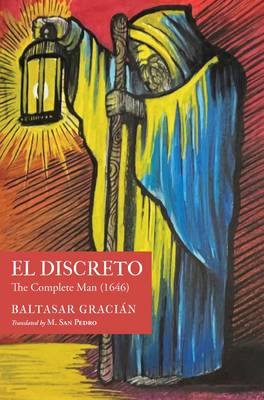
- Afhalen na 1 uur in een winkel met voorraad
- Gratis thuislevering in België vanaf € 30
- Ruim aanbod met 7 miljoen producten
- Afhalen na 1 uur in een winkel met voorraad
- Gratis thuislevering in België vanaf € 30
- Ruim aanbod met 7 miljoen producten
Omschrijving
Almost four hundred years ago, in Zaragoza, Spain, Baltasar Gracián began to write what many modern-day scholars consider to be the most prolific and mysterious of his seven works, El Discreto: The Complete Man (1646). It is a treatise that describes the qualities that are needed for a man to become the center of perfection, as he experiences life and its spacious fields of time. Through his mystifying, divinized, and sacred style, he explores the themes of moral and political philosophy, literature, criticism, human nature, morality, and the complexity of social relationships. It is a discourse full of fables, metaphors, allegories, and wordplay that requires the reader to measure himself against the greatness of its matter in order to understand and benefit from its wisdom.
Chained to a linguistic barrier for centuries, with its complexity making it nearly impossible to translate into English, this Spanish masterpiece has remained largely unavailable to modern readers until now. This fascinating book, which Friedrich Nietzsche referred to as "the finest and most complicated work to ever come out of Europe," contains all that is needed to become a Master of Matters and a Master of Men.
Praise
"In the experience of life, Gracián shows incomparable wisdom." -Friedrich Nietzsche
"My favorite author is the philosophical Gracián, all of whose books I have read." -Arthur Schopenhauer
"This jewel of a man is very gifted; I assure you that he contains great things." -King Philip IV of Spain
"No one who precedes him, nor those who follow him, will be able to surpass him in genius and ingenuity; he is the ne plus ultra." -Don Vincencio Juan de Lastanosa, Spanish Noble and Knight
About the translator
Moises San Pedro, professionally known as Mike San Pedro, is a writer and philosopher. He is a student and historian of Baltasar Gracián and a friend of his singular spirit.
Specificaties
Betrokkenen
- Auteur(s):
- Uitgeverij:
Inhoud
- Aantal bladzijden:
- 188
- Taal:
- Engels
Eigenschappen
- Productcode (EAN):
- 9781945028526
- Verschijningsdatum:
- 13/07/2023
- Uitvoering:
- Hardcover
- Formaat:
- Genaaid
- Afmetingen:
- 127 mm x 203 mm
- Gewicht:
- 303 g

Alleen bij Standaard Boekhandel
Beoordelingen
We publiceren alleen reviews die voldoen aan de voorwaarden voor reviews. Bekijk onze voorwaarden voor reviews.











